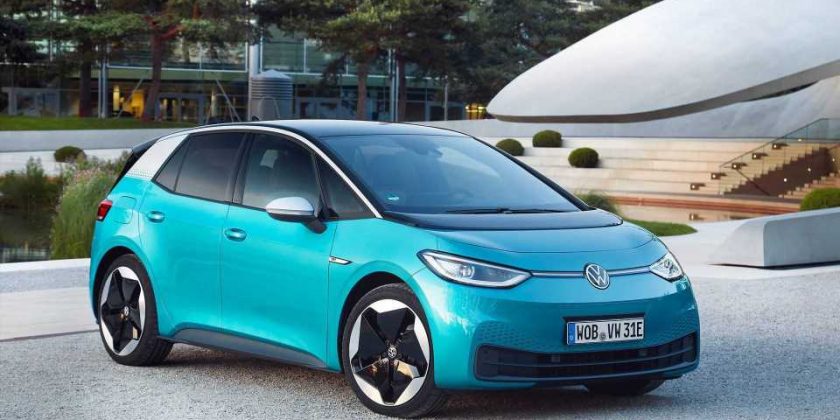Almost 400,000 plug-in electric cars were sold in 2020.
December was the culmination of an unprecedented expansion of plug-in electric cars in Germany, Europe’s biggest automotive market.
Because of the necessity to comply with stricter CO2 emission requirements in the European Union, high EV incentives and a broader choice of models, sales went through the roof.
There are records basically in all categories – monthly volumes and shares, as well as annual volumes and shares, as well as for most of the brands and many individual models.
Let’s get into it. The number of new passenger plug-in car registrations increased in December by 631% year-over-year to an all-time record of 82,778. The market share has reached 26.6%, which is more than one plug-in per four new cars!
Sales of BEVs and PHEVs seem quite balanced again:
- BEVs: 43,671 – up 660% at 14.0% market share
- PHEVs: 39,107 – up 601% at 12.6% market share
- Total: 82,778 – up 631% at 26.6% market share
The conventional hybrids also improved by 244% to 81,108, but the gasoline and diesel sales went down, respectively by 30.5% (to 117,228) and 19.9% (to 67,642).
Plug-in electric car registrations in Germany – December 2020
The expansion in late 2020 completely overshadowed the results in previous years, which now look flat (but they were not flat at the time – the growth was quite healthy actually):
And here is a quick look at the BEV/PHEV sales comparison:
Plug-in electric car registrations in Germany – 2020
The year 2020 ended with over 394,000 new plug-in electric car registrations (up 263% year-over-year). It’s 13.5% of the market – a year ago we were not expecting that such high values were possible in 2020.
New registrations year-to-date:
- BEVs: 194,163 – up 207% at 6.7% market share
- PHEVs: 200,469 – up 342% at 6.9% market share
- Total: 394,632 – up 263% at 13.5% market share
The cumulative number of plug-in electric cars sold in Germany over the past seven years is close to 700,000 (almost 400,000 in 2020).
Sales of brands/models – December 2020
Last month, Volkswagen and Mercedes-Benz were the undisputed market leaders in Germany – the first in all-electric car segment, while the second in the plug-in hybrid segment.
Only Renault managed to break into the top, between German brands, ahead of Audi and BMW. Tesla this time was sixth.
Brands that recorded the highest number of plug-in car registrations were:
- Volkswagen: 19,039 – 13,338 BEVs and 5,701 PHEVs
- Mercedes-Benz: 13,092 – 1,797 BEVs and 11,295 PHEVs
- Renault: 7,427 – 6,266 BEVs and 1,161 PHEVs
- Audi: 5,842 – 614 BEVs and 5,228 PHEVs
- BMW: 5,596 – 1,250 BEVs and 4,346 PHEVs
- Tesla: 3,545 – 3,545 BEVs
- Hyundai: 3,349 – 3,101 BEVs and 248 PHEVs
- SEAT: 3,078 – 382 BEVs and 2,696 PHEVs
- smart: 3,077 – 3,077 BEVs
- Skoda: 2,566 – 646 BEVs and 1,920 PHEVs
- Volvo: 2,495 – 109 BEVs and 2,386 PHEVs
- Opel: 1,649 – 1,483 BEVs and 166 PHEVs
- Kia: 1,423 – 635 BEVs and 788 PHEVs
- Peugeot: 1,350 – 1,228 BEVs and 122 PHEVs
The Volkswagen ID.3 shines among all-electric cars with record 7,144 registrations! Only the Renault ZOE was able to get close to ID.3 with 5,349 units.
It seems that the Tesla Model 3 was third in it’s volume delivery month with 3,293 units, followed by the Hyundai Kona Electric (2,995). In December we saw also 2,306 registrations of the new Volkswagen ID.4.
There were multiple plug-in hybrid models in the thousands as well.
Sales of brands/models – 2020
Four German brands -Volkswagen, Mercedes-Benz, Audi and BMW sold the most plug-in electric cars in 2020. Renault joined the top five.
The Volkswagen Group was the biggest automotive group with some 130,000 units (a third of the market).
Plug-in car registrations by brands:
- Volkswagen: 68,744 – 46,193 BEVs and 22,551 PHEVs
- Mercedes-Benz: 58,718 – 4,494 BEVs and 54,224 PHEVs
- Audi: 35,635 – 8,356 BEVs and 27,279 PHEVs
- BMW: 34,138 – 8,700 BEVs and 25,438 PHEVs
- Renault: 34,082 – 31,477 BEVs and 2,605 PHEVs
- Hyundai: 17,692 – 15,941 BEVs and 1,751 PHEVs
- Tesla: 16,694 – 16,694 BEVs
- smart: 16,035 – 16,035 BEVs
- Volvo: 15,201 – 109 BEVs and 15,092 PHEVs
- Skoda: 13,106 – 4,751 BEVs and 8,355 PHEVs
- Kia: 12,813 – 5,909 BEVs and 6,904 PHEVs
- Opel: 10,758 – 6,963 BEVs and 3,795 PHEVs
- Mitsubishi: 9,155 – 9,155 PHEVs
- MINI: 7,751 – 4,365 BEVs and 3,386 PHEVs
- Ford: 7,514 – 209 BEVs and 7,305 PHEVs
- Porsche: 6,356 – 3,203 BEVs and 3,153 PHEVs
- Peugeot: 6,047 – 4,008 BEVs and 2,039 PHEVs
- SEAT: 5,464 – 2,149 BEVs and 3,315 PHEVs
- Nissan: 4,050 – 4,050 BEVs
- Mazda: 3,782 – 3,782 BEVs
- Jaguar: 1,341 – 1,341 BEVs
- Honda: 1,135 – 1,135 BEVs
- Land Rover: 1,078 – 1,078 PHEVs
- Jeep: 1,026 – 1,026 PHEVs
- Citroën: 1,011 – 224 BEVs and 787 PHEVs
- Fiat: 872 – 872 BEVs
- Toyota: 555 – BEVs and 555 PHEVs
- DS: 791 – 218 BEVs and 573 PHEVs
According to our data, the top selling BEV model for the year was the Renault ZOE with 30,376 registrations!
As the Volkswagen ID.3 was late at the party (14,493), more registrations were noted by the Volkswagen e-Golf (17,438) and the Tesla Model 3 (15,202). The Hyundai Kona Electric was fifth BEV (14,008).
For those, interested in Tesla results – 777 Model S and 714 Model X – is not too high, especially compared to Audi e-tron EVs – 8,356.
Official stats:
Source:KBA
Source: Read Full Article






